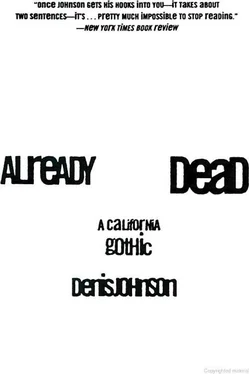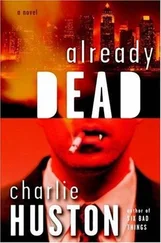In his sleep Fairchild turned over, and water poured into his mouth. He’d experienced dreams of such terrors. Yet this seemed like waking. Not sleep, but numbness. A vast stampeding liquid clucked about his head and dragged at his right sleeve, turning Already Dead / 259
him over again and smothering him again. In order to wake himself he screamed: a distant sound, played back at reduced RPM, a slowmotion voice that suddenly he heard quite loudly as his head surfaced.
His eyes opened on the brilliant coast of Mendocino County a quarter-mile distant, brilliant for its springing up into view, but actually washed in the sunset. Bald-faced cliffs, and the flat scalp of trees raked over toward the ocean, and — as again the currents upended and released him — a sky without planets or stars, and the moon no more than a rind, all this too daylit to be a dream. Facing the empty horizon now. Any strength frozen out of him. Echoing off to his right, the sound of water sucking at rock. He willed to swim his way to the sound, but his hands stirred around his hips only by the action of the seething liquid. His ear raked against something painful, and an unaccountable spasm sent his left hand flying toward it. He draped his arm over an outcropping and thus kept his breath above the eddies. Let the motion lift him.
Moving, it seemed, entirely by the power of a visceral desire. Virtually without the ability even to raise his foot. Slowly took himself aboard.
Rested in the lee of the rock and the shadow of its brow. Spray coming around the corner made a rainbow. The sun slowly found him. He lay back on the rock and his flesh felt for any amount of warmth where the late light touched it. No other sensation reached him.
The left side of his head began to feel warmer than any other part of him, and before long it produced a pulse that became an unbearable black booming in his skull. His legs and back began hurting, and all this he took as a signal that some kind of life had been granted him. By rolling onto his left side and clutching at a knob of stone, he raised himself slightly and took his bearings, anxiously mindful of the sun’s descent, of the coming darkness in which he’d be stranded. This rock lay not too far off Schooner Beach, south of Point Arena — he’d come half a mile along the water and hardly participated in the process. On the shore stood a palomino pony, bareback and free, alternately staring off toward the sunset and nodding at tufts of grass. From here three rocks made a line generally southeast toward it. He could flounder from one to the next and deliver himself back to the shallows. From there he didn’t know. His legs might move him toward the land, or he might be carried back strengthless into the swells.
260 / Denis Johnson
He put his face to the flat, glimmering debouchment and sucked until his lips were numb, then got upright and vomited weakly and went on climbing the steady rise alongside Schooner Creek to the Coast Highway. The exertion warmed him, but the hires of this incredible day came final as he reached the lay-by at the road, and he closed himself in a sturdy government outhouse, sitting on the cessbox, leaning sideways into the corner, pulling his feet up out of the ventilating draft across the floor, sleeping while the chill worked back into his bones and later waking aghast, baffled, in this chamber like an upright coffin.
He fought to his feet, banged out into the blustery dark and oriented himself. Rather than use the facilities, he stood next to the cubicle working at the zipper of his damp whites, and urinated at length on the ground before setting out south along California 1. When he heard a vehicle approaching he stood still with his thumb raised, but as the lights topped the rise he took himself into the roadside trees and hid while it passed by. A half mile along, a raincloud caught him coming up the coast. It blew over in minutes.
Just north of the property he came on the site of a recent accident, long white painted lines intersecting with skid marks, designs of blood on the pavement, the scattered stub ends of highway flares. A secret aftermath. None of it easily discernible in the night. The lights turned off on a party where everyone’s been arrested. A party where the child has died. The birthday a deathday, the roman candles deranged by the wind and dribbling brimstone.
He veered from the path to the front door and stood in the slight illumination of the living room window, looking in; warm now from his hike of several miles, overly warm, and breathing hard. Still wet and stinking of the sea. Smelling of brine and spilt diesel. His reflection a mist-like darkness in the glass. — I’m the Coast Silky now. He put his face against this faceless other’s. Saw nobody in the dim living room.
He heard her voice inside, talking low, and sensed by its tones the presence of an evil guest. Then he saw her pass the window, silhouetted in the aura from a candle. Just a shadow. This was now absolutely the way of all. — I’ve made a world in which the men are Already Dead / 261
sinister and the women completely opaque. In the shifting dark now shapes stir.
He tapped the glass with his fingertips. “Yvonne.” If she wasn’t alone he would leave. Again he tapped, and the shape came close. “Yvonne. It’s Nelson.”
“Nelson?”
“Nelson Fairchild. I want to see you. Is anybody there?” She turned and went to the front door. He sighed and tapped against the glass again, but she didn’t hear.
He met her where she stood in the doorway looking right and left into the dark. “Nelson—”
“Who’s with you?”
She backed away into the house as if she thought he’d do her violence.
Stood in the center of an oval rug of Persian design in the center of the room, her legs silhouetted in billowy pantaloons and her midriff bare, like the denizen, the chief wife in fact, of some pampering seraglio. She looked strained, even woozy, to the point that his own condition went unmentioned now.
Ah, your true music: a tuneless keening in the woods.
He followed her in. “Who’s here?”
As he shut the door against the night she sat on a hassock by the woodstove and hugged herself and sighed, averting her face.
“Where’s Ocean?”
“Ocean.”
“The young friend. I thought she lived here.”
“Ocean is gone.”
“There’s something wrong here.”
“It doesn’t involve you.”
“Maybe it does.”
“No.”
“I think it does.”
She sighed once again, left off embracing herself and held her palms out toward the stove. She turned her face from it to gather in the sight of him at last.
“You’re wet.”
“I walked here from — from where I fell in. From where I got out.” She stood up, beckoning. “Sit here.” He took her place on the hassock and understood none of this. He put the heels of his hands against the sockets of his eyes and lowered his elbows to his knees.
262 / Denis Johnson
Thus he held his head up. He became aware of a cedary incense around him. Maybe sandalwood.
He heard her leaving. Heard drawers in the kitchen. He thought he heard her weeping in there and raised his head.
She came out with a white, flowered dishtowel and draped it gently over the back of his neck and raised its corner to press against his scalp.
“You’re bleeding. Or you were.”
“God, that hurts.”
“I’m just wiping away the blood. Your ear is terribly swollen.”
“I was out, unconscious. I should have drowned.” She sat next to him and with tenderness applied the towel against his wound. “Did you by any chance see the kelpie?”
“Kelpie who?”
“The kelpie. A water sprite. Usually she takes the form of a horse.
She comes to drowning sailors.”
Читать дальше












